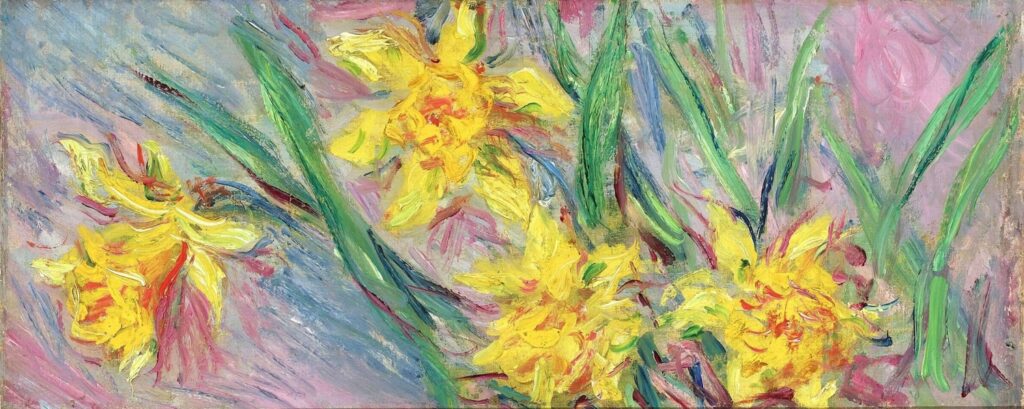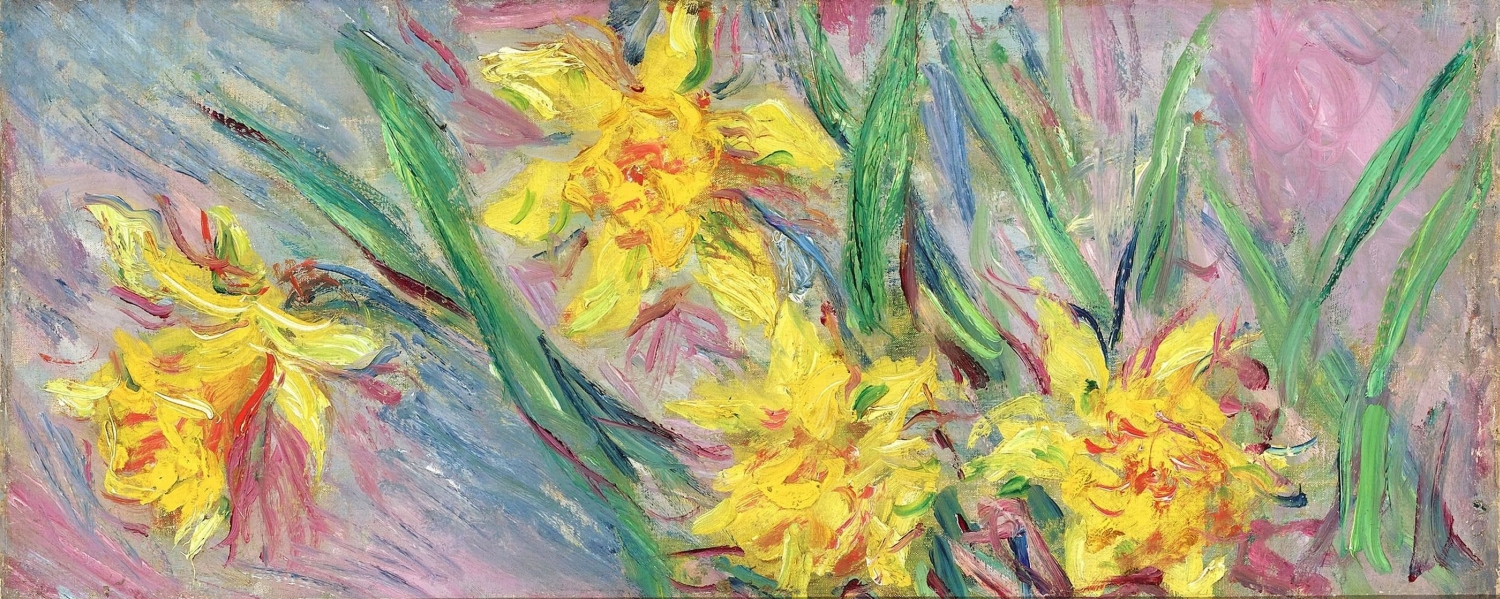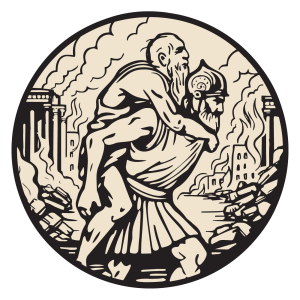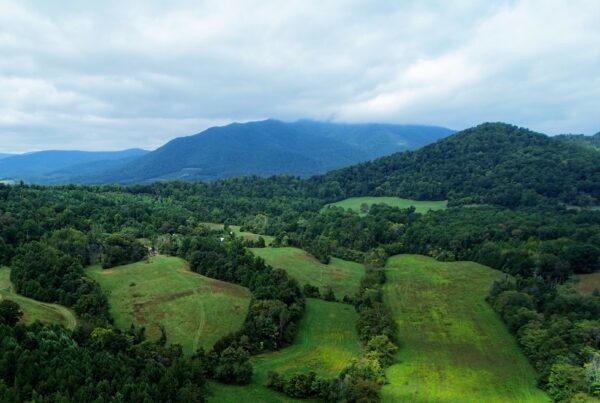Today we feature an essay by Andrea Perkins, wife of St. Dunstan’s Chaplain and Assistant Headmaster.

A Prayer in Spring
by Robert Frost
Oh, give us pleasure in the flowers to-day;
And give us not to think so far away
As the uncertain harvest; keep us here
All simply in the springing of the year.
Oh, give us pleasure in the orchard white,
Like nothing else by day, like ghosts by night;
And make us happy in the happy bees,
The swarm dilating round the perfect trees.
And make us happy in the darting bird
That suddenly above the bees is heard,
The meteor that thrusts in with needle bill,
And off a blossom in mid air stands still.
For this is love and nothing else is love,
The which it is reserved for God above
To sanctify to what far ends He will,
But which it only needs that we fulfil.
A few years ago I was standing in my friend’s kitchen chatting with her and her teenage daughter. As we were talking about our homeschooling plans for the year, which included memorizing poems, as well as hymns and Scripture, her daughter asked us, “Why is memorizing poetry important?” It’s an understandable question and one I think of frequently. I see the importance and experience the reward of poetry memorization a little more each year — it’s that proper poetry arsenal Mr. Fickley wrote about last summer.
In September, while walking in the Northwoods of Michigan’s Upper Peninsula, our daughters (6 and 8) began spontaneously reciting Robert Frost’s “In Hardwood Groves” as we tramped through the damp, matted carpet of fallen leaves (The same leaves over and over again! / They fall from giving shade above / To make one texture of faded brown / And fit the earth like a leather glove…). It first startled me and then brought me such joy as I realized they had just hung their experience in the woods on the “hook” of Frost’s lovely autumn poem, and now they will think of it every time they walk through fallen leaves.
Poetry gives voice to our experiences in wonderful (and sometimes unexpected) ways. Having verses committed to memory means we are better equipped to articulate and understand certain experiences. Even mundane, everyday tasks can be elevated or heightened through the use of fitting language and description.
Our poetry focus for this school year is the work of Robert Frost. We are currently learning “A Prayer in Spring” which, I was surprised to find, speaks directly to my relationship with the current stage of development in the life of St. Dunstan’s. Having these lines of verse running through my head has helped me identify my internal struggle to appreciate where things are while hoping for where they will one day be — it’s easy to want to fast forward to a flourishing, bustling life on a developed campus!
Oh, give us pleasure in the flowers to-day;
And give us not to think so far away
As the uncertain harvest; keep us here
All simply in the springing of the year.
And this isn’t only true for St. Dunstan’s but of all of life — aren’t we often eager to jump ahead in time, forgetting to be mindful and attentive to our current moment? Too many times have I checked the calendar, impatient for the last frost date so I can plant my tomatoes, peppers, and basil. But that time will come. Now is the time for admiring daffodils and grape hyacinths and planting peas and lettuce.
Oh, give us pleasure in the orchard white,
Like nothing else by day, like ghosts by night;
And make us happy in the happy bees,
The swarm dilating round the perfect trees.
The daffodils have been magnificent this spring. Perhaps it’s because we spent the last three years in Florida, where there are precious few daffodils, but their bright faces have brought me more joy than ever and now, each time I look at one I cannot help but pray “Oh, give us pleasure in the flowers today.”
We think, work, play, worry, wonder, and just like that the present moment is over. Yet we must be attentive to the ever-fleeting present moment, granting ourselves true pleasure in what it has to offer.
And make us happy in the darting bird
That suddenly above the bees is heard,
The meteor that thrusts in with needle bill,
And off a blossom in mid air stands still.
My husband, Fr. Mark, is the school’s chaplain. He recently returned from his seventh trip since the end of January. It has been a tough season full of travel but we made it and we are excited about what we are helping build. This Frost poem has been remarkably helpful to me in keeping my attitude in check when things get hard and in reminding me how important (rejuvenating!) beauty and wonder are, if we have but eyes to see and ears to hear. We mustn’t allow moments of discouragement or challenge to distract us from the good gifts right in front of us and the love and provision God showers upon us. Along with Frost’s “A Prayer for Spring,” two related passages of Scripture have been marching through my mind and by the reciting and the hearing of them, I am encouraged and sustained: Give us this day our daily bread / Trust in the Lord with all your heart and lean not on your own understanding.
This is why we memorize.
For this is love and nothing else is love,
The which it is reserved for God above
To sanctify to what far ends He will,
But which it only needs that we fulfil.
Therefore I say to you, do not worry about your life, what you will eat; nor about the body, what you will put on. Life is more than food, and the body is more than clothing…. And do not seek what you should eat or what you should drink, nor have an anxious mind. For all these things the nations of the world seek after, and your Father knows that you need these things. But seek the kingdom of God, and all these things shall be added to you. Luke 12:22-23, 29-31
—
For those interested in Robert Frost poetry books for kids, here are a few we enjoy.
Stopping by Woods on a Snowy Evening. The Frost poem with illustrations by Susan Jeffers.
Poetry for Kids: Robert Frost. Illustrated by Michael Paraskevas.
Poetry for Young People: Robert Frost. Edited by Gary D. Schmidt and illustrated by Henri Sorensen.
Selected Poems of Robert Frost: Illustrated Edition. Beautifully illustrated with woodcuts by Thomas Nason.





